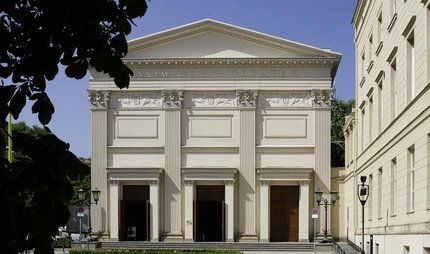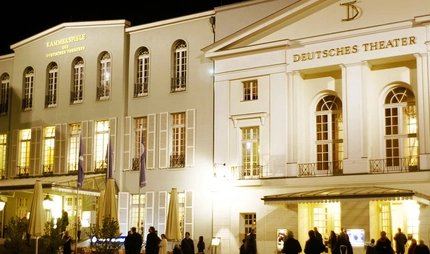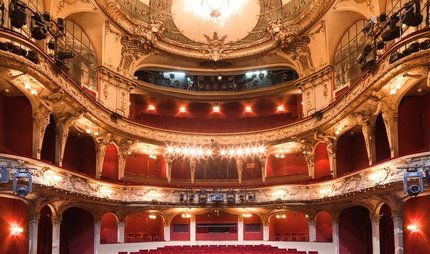
Volksbühne am Rosa-Luxemburg-Platz
A long tradition of experimental theatre
The Volksbühne am Rosa-Luxemburg-Platz – leading German film actors, experimental theatre and provocative productions, some even with English surtitles!
Here you can see theatrical experiments and well-known actors on stage: The Volksbühne Berlin stands for experimental, political theatre. The ensemble has included well-known film actors such as Henry Hübchen, as well as Alexander Scheer, Martin Wuttke, Marc Hosemann, Silvia Rieger, Sophie Rois and many others. For over 110 years, the theatre has shaped the Berlin theatre scene with productions that constantly rethink the classical theatre space.
In addition to much-discussed critical analyses of contemporary issues and multimedia adaptations of novels, the legendary productions by Christoph Marthaler, Christoph Schlingensief (†), Dimiter Gotscheff (†) and René Pollesch (†) in particular caused an international sensation during the Castorf era.
In keeping with the Volksbühne's "expanded concept of theatre", you can also experience concerts and literary or film events here - the canteen sometimes becomes an eventful rehearsal room or even a theatrical venue.
From 1992-2017, the Volksbühne was directed by Frank Castorf. In productions lasting several hours, Castorf worked on the permanent self-exploitation of the actors and the aesthetic challenge of the audience. He used the original play as a quarry and combined it collage-like with political manifestos, philosophical texts or dramas by other authors. Under his directorship, the Volksbühne was twice voted Theatre of the Year in the critics' survey conducted by the theatre magazine "Theater heute". Klaus Dörr then took over as interim director of the theatre.
With the 2021/22 season, René Pollesch, supported by many others, took over the Volksbühne, which focuses on drama and dance, but also music, performance, film and discourse. Matthias Lilienthal is the designated artistic director from the 2026/27 season.
In addition to the main stage in the "Grosses Haus", the theatre also includes the Red and Green Salon, the Sternfoyer as well as the stage on the 3rd floor and the backstage.
The Volksbühne theatre attracts around 130,000 spectators per season and offers an average of more than 20 events per week. Volksbühne productions are regularly represented at the Berlin Theatertreffen and at international festivals.
From critical GDR performances to multi-genre theatre
Built in 1914 to a design by Oskar Kaufmann on the former Bülowplatz, the building was almost completely destroyed in the Second World War and rebuilt in the early 1950s according to plans by Hans Richter. In the GDR, the Volksbühne became a modern director's theatre, which was particularly provocative with plays by Heiner Müller and productions by Benno Besson and Fritz Marquardt.
Some of the plays have English surtitles. Please enquire in advance.
There are only limited parking spaces available around the Volksbühne.
Opening hours
| Box office | |
|---|---|
| Monday | |
| Tuesday | |
| Wednesday | |
| Thursday | |
| Friday | |
| Saturday | |
| Sunday |



